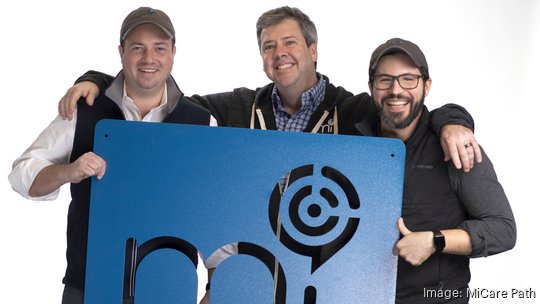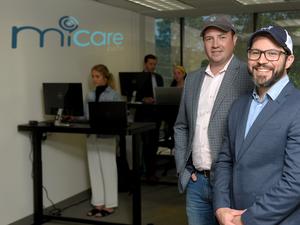
Somehow, when MiCare Path moved from the UMRF Research Park to its current space at 5900 Poplar Ave., a loose pingpong ball traveled with it. And when I met with the startup’s leaders recently, I was fiddling with this, bouncing it in and out of a narrow, empty glass on the conference room table.
This led MiCare COO Corey Patrick to pose a question: Could I place the ball at the bottom of the glass, then remove it without touching the glass?
I couldn’t.
“You’ve got to think outside the box,” Patrick said.
“Do you have 'The Force' or something?” I asked.
As it turned out, Patrick’s solution was to pour water into the glass, which would bring the ball to the top. When he was in 10th grade, the question had been posed to his class by FBI agents who were guest speakers, and he had provided this answer quickly.
Using water to pick up a pingpong ball, though, is just one of the ways Patrick can “think outside the box.” It’s something he and the other leaders of MiCare seem to do regularly. CEO Scott Laster referred to it as a “core tenet of our business.”
And that business is one looking to provide major relief to an industry that many believe is overburdened: health care.
The MiCare platform
Laster’s wife has chronic non-operable scoliosis; Patrick’s mother had rheumatoid arthritis; and chief commercial officer Brian Childress is a cancer survivor. So the three have seen and felt the challenges health care is facing, and the impact it can have on both patients and providers.
The time between office visits can last a long time and cause frustration — especially when people don’t always get as much face time with their physicians as they would like.
“We've all had our own personal experiences with health care. And while everyone is hopefully trying to do the best for each patient, health care is just broken,” Laster said. “There are things that don't work well. And physicians don't have time to give the patients — even in an office visit, if they’re honest with themselves — that probably is merited.”
MiCare’s digital health platform, however, could strengthen the connection between patient and provider, as it’s designed to give physicians and other care practitioners real-time feedback on patients. It has over 17 different types of high-quality medical devices with cellular or Bluetooth capabilities, and these are connected to its platform and given to patients.
Take, for example, someone who struggles with high blood pressure. They can be given a MiCare cuff, and whenever they measure their blood pressure, the physician can monitor it on the company’s platform in real-time. This way, they can quickly see if the treatment prescribed to the patient has been working. And if not, they can adjust it immediately.
A primary goal is to make the care process more comprehensive and efficient, while also strengthening the communication and connection between patients and their care teams between office visits.
“We're trying to give answers — and confidence in those answers — to people,” Childress said. “Why has it been accepted in health care that you go in blind and then sometimes you come out frustrated? All stakeholders suffer from that. Payers suffer from it. Providers suffer from it. And the patients suffer from it.”
The platform has the potential to catch and correct issues before they become serious problems, and it’s expanded in scope.
Initially, MiCare focused on orthopedics, a fitting choice for a startup founded by veterans of Smith & Nephew’s orthopedic operations. But Laster and co. ultimately realized that their platform could address a wide variety of specialties, and they’ve adjusted to work with many types of clients.
“We found out that with very little energy, we could pivot and sort of address their needs,” Childress said. “What we've realized is the scaffolding that we built, this platform, is really agnostic.”
Or as Laster put it: “It’s like some guy made a ball bearing … that worked in all cars.”
Securing funds
MiCare's platform has been popular within the health care sector, and the firm has grown significantly since its inception.
When MBJ first covered MiCare in May 2021, the med tech startup had just a few employees and several pilot customers. But when I spoke to its leaders recently, the startup had around 20 employees and partner clinics that have locations in over 30 states.
As it grows, MiCare is generating revenue, and it’s gearing up to raise more seed funds as it looks to continue scaling its business. The company has already completed an initial funding round of $1.28 million and a Series A round of $5 million; and in April, it will launch a bridge round, with the goal of bringing in another $5 million or so.
Then, in the fall, the business is expected to launch a Series B round, for which a target number has yet to be determined. As the MiCare leaders have learned, scoring major deals is more difficult when you’re representing a startup and not a corporate giant like Smith & Nephew, and the precise steps they take next will hinge on the amount they raise.
“The truthful thing behind fundraising is, if we had another $5 million, well, we could make that work; we could go achieve these goals with that,” Laster said. “If we had $15 million, we could do these different types of things. If we had $30 million, we could go tuck in some technology companies and do other things with it. It's just a matter of, 'Can a company in Memphis go find those types of sources of funding?' [It] is a perpetual problem for all companies in small- to mid-sized cities that aren't Boston [or] San Francisco.”
Regardless, the MiCare leaders are confident they can achieve their goals and be successful.
After all, they’ve shown they can think outside the box.
“The five-year plan is to try to help enable care when you want it in an asynchronous way, that's efficient for providers and meaningful for patients,” Laster said. “This is the vision of the business. We know we’re going to get there."









